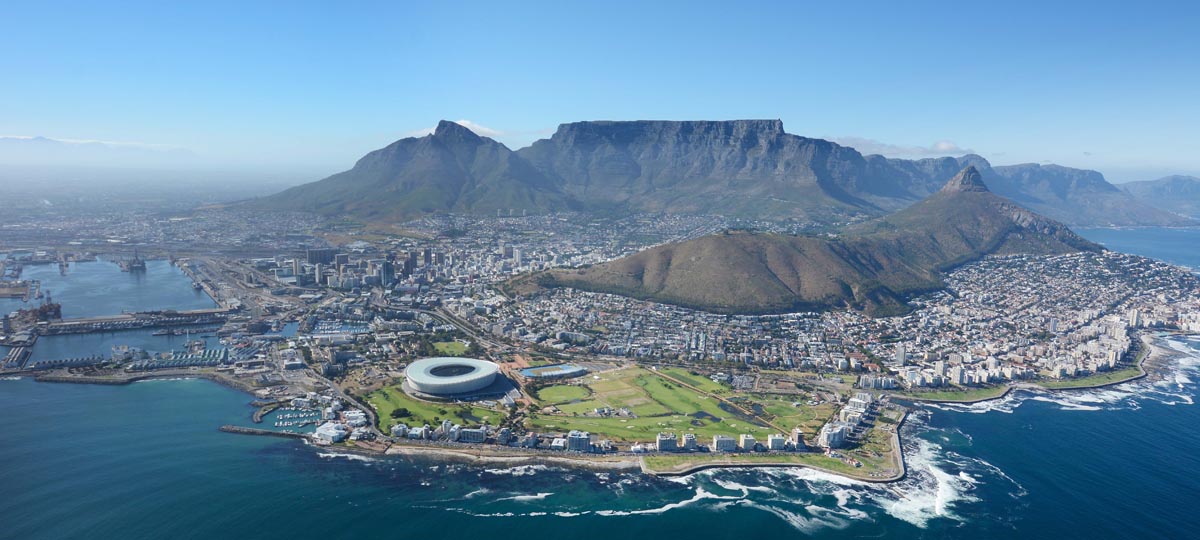SOUTH AFRICA TRAVEL TIPS
Arrival and Departure Formalities
Please check with your nearest South African Consulate for up to date information.
All visitors are required to carry a passport that is valid for six months beyond the intended length of stay. There should be sufficient blank pages next to each other per entry.
Please contact your local South African Embassy to establish whether a visa is required.
Time Zone
GMT + 2 hours.
Baggage Restrictions at OR Tambo International Airport
Please take note of the below baggage restrictions at OR Tambo International Airport
- Only regular-shaped bags will be allowed to be checked in. This means that the bags must have at least one flat surface to be accepted
- Round or irregular-shaped bags will not be allowed
- Bags with longs straps will not be allowed
Passengers who try to check in bags that don’t conform to these rules will have the option of having their baggage wrapped with one flat side at airport-approved baggage wrapping stations.
Travelling with children
Foreign children under the age of 18, travelling to South Africa need to produce the below on arrival. Foreign children who require a visa for South Africa do not need to carry additional documents for inspection at a port of entry since these would be processed together with their visa applications. Please bear in mind that when travelling to Namibia and Botswana certain documents will still be required including an unabridged birth certificate.
Child and both parents
- A valid passport for the child
Child and one parent
- A valid passport for the child
Child and guardian
- A valid passport for the child
Child unaccompanied
- Copy of his /her birth certificate
- Parental consent letters
- Copy of the passport(s)/identity document(s) of the parent(s) / legal guardian(s)
- Contact details of the parent(s)/ legal guardian(s)
- Letter from the person who is to receive the child in the Republic, containing his / her residential address and contact details in the Republic where the child will reside
- Copy of the identity document / valid passport and visa or permanent residence permit of the person who is to receive the child in the Republic
- Where applicable- copy of an adoption order / copy of a death certificate of the deceased parent/ parents or legal guardian; or copy of a court order granting full parental responsibilities and rights or legal guardianship in respect of the child
Currency
The monetary unit of South Africa is the Rand, divided into cents and abbreviated as R and C.
Notes currently in circulation are to the value of R200; R100; R50; R20 and R10. Coins are in denominations of R5; R2; R1; 50c; 20c; 10c; 5c. All currency must be declared on entry into South Africa.
Money Matters
Banking hours
Monday to Fridays 09:00 - 13:30
Saturdays 08:30 - 11:00
Sundays and Public Holidays all banks are closed.
Credit cards
All major credit cards are accepted at most hotels, lodges, shops and restaurants although Visa and MasterCard are most widely accepted.
Tax Value Added Tax (VAT) of 15% is levied in South Africa. Overseas visitors taking goods out of South Africa are able to reclaim the VAT, which they paid on these goods. Reclaiming VAT is only applicable for goods that you are able to produce at the airport and not for any services whatsoever. When purchasing your products you should request a tax invoice. The shop’s VAT number must appear on this invoice. As you are checking in at the airport ready to depart from South Africa, you should approach the customs official who will compare your invoices with the goods purchased. Once your invoices have been approved and stamped, the VAT Reclaim Office will refund you the appropriate amount. VAT Reclaim Offices are found at Johannesburg, Durban and Cape Town Airports.
Weather
Best time to go to South Africa
Winter May – August
Summer September – April
South Africa is a big country just south of the tropic of Capricorn, but it is the topography and surrounding oceans that influence its climate, rather than the latitude. Although the climate varies from region to region, it is generally mild and sunny throughout the year. On the whole it is a dry country with a mean annual rainfall of 502mm. Snowfall is limited to the highest mountain peaks.
Summer temperatures average between 15 ºC and 32ºC (59ºF - 89ºF). Winter temperatures average between 0ºC and 18ºC (32 ºF – 64ºF). KwaZulu-Natal has a sub-tropical climate with high humidity in summer.
The southern Gauteng region has hot summers with occasional thundershowers and frosty winters, while the eastern part of this region (known as the Lowveld) enjoys mild winters. The Cape interior and the Free State have similar weather conditions to the southern Gauteng region.
Clothing
Casual, comfortable wash and wear clothing is most useful. Jackets and ties are required in city hotel restaurants and golf clubs. All hotels offer extremely quick laundry turnaround, usually within a couple of hours. It is certainly not necessary to bring a separate change of clothing for each day and evening, and it is recommended that you keep luggage to a minimum for your own comfort and ease of transport, especially if you are using light aircraft transfers.
• Shorts & Cotton T-shirts
• Swimming costume
• Good comfortable walking shoes (hiking boots are not required unless you have booked a walking safari)
• Casual lightweight cotton, khaki or neutral coloured clothes for safari
• Fleece or sweater and a warm jacket for game drives or cool evenings
• Wide brimmed hat/cap
• Personal toiletries, sun barrier creams; lip balm and insect repellent
• Binoculars, camera and accessories
• Sunglasses
• Rovos Rail guests pack elegant wear for ladies and jacket and tie for men
For travel to South Africa in summer months, lightweight clothing made of a natural, “breathable" fabric is recommended with a warm sweater or jacket for cooler evening temperatures. In winter, warmer clothing is suggested, especially for evenings and you will want to pack an extra sweater or hooded warm-up jacket, a warm hat and gloves. All luxury hotels and most game lodges offer a same-day laundry service (at additional charges). This is a good reason not to pack too many clothes.
Health
It is important that you check with a qualified health professional for the most current information concerning your travel itinerary and personal health history.
Anti-Malarial precautions are an absolute necessity when visiting the game parks in the region. It is important that you check with a qualified health professional for the most current information concerning your travel itinerary and personal health history.
South Africa offers excellent medical facilities, and is the preferred country for treatment in the region. We do advise you to take out travel insurance to cover any possible medical treatment, and if necessary, emergency evacuation. All hospitals charge tourists as private patients and may require payment by cash.
The sun in the southern hemisphere is extremely strong - do wear an effective sunscreen and hat during the summer. It is advisable to avoid the noonday sun. Recommended SPF is 30.
Throughout Southern Africa it is safe to eat all foods and drink tap water in cities and towns. Purified water in flasks or bottled water is provided at game lodges throughout the region. It is also suggested that you bring a smaller traveller’s kit with remedies for minor stomach ailments or motion sickness. You should include an adequate supply (in your hand luggage) of any prescribed medication you may require while traveling.
If you are entering South Africa from a yellow-fever zone you will need a valid international yellow-fever vaccination certificate.
Travelers with physical disabilities and those who require frequent or on-going medical attention should advise us of their health situation at the time of booking (or at the time such a situation occurs should this be after the reservation is made).
We do recommend that you take out comprehensive travel insurance to cover you in the event of a medical emergency.
Electricity
South Africa's electrical system is 220/230 volts A/C 50 cycles.
Local Food
Throughout South Africa it is generally safe to eat all foods, including salads and fruit served in restaurants. It is also safe to drink the tap water in cities and towns. Purified water in flasks or bottled water is usually provided at Game Lodges.
Other Notes
Common sense should prevail and precautions should be taken as in any major city. Use hotel and lodge safety deposit boxes. If walking in towns or cities only carry small amounts of cash, do not wear obvious jewellery and keep a close eye on your handbag or wallet. Never leave valuables, especially money and documents unattended in the hotel room or vehicle.
Rather than walk, we recommend that you take a taxi in cities at night. Ask the hotel or restaurant doorman to arrange your cab.
Tipping
Tipping is not compulsory. You are travelling on an independent itinerary and the cost of your program does not include gratuities. Tipping is a very personal matter and should only be considered when the staff have gone above and beyond for you. Should you feel you would like to acknowledge their service, please consider the following as a rough guide, per day.
Tour Director - 205
Driver / Guide (Half day) - 110
Driver / Guide (Full day) - 165
Hotel Porters - 40
Professional Guide - 205
Ranger - 205
Tracker - 110
Lodge staff - 165
Please note: Currency is in ZAR
The above tipping guidelines are recommendations only and are not compulsory. Please use your own discretion in tipping, based on quality of service.
Restaurants
It is customary to add 10% to the bill in restaurants, if the service has been satisfactory.
Taxis
Taxi drivers do not expect to be tipped but they appreciate the fare being rounded up.
Porterage
If you are being transferred by our representative from the airport to a hotel, then porterage and tipping of porters is already included. You are not expected to tip our representative. Porterage and tipping of porters for transfers from one hotel to another is as above.
Blue Train and Rovos Rail
Tip at the end of your journey ZAR 205 per person per day. These gratuities may be placed in a central box or an envelope, which will be provided.




